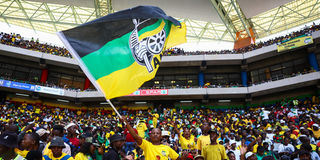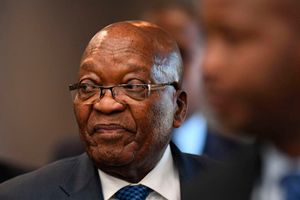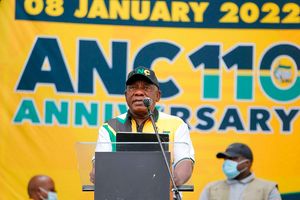
An African National Congress (ANC) supporter waves a flag during the 112th anniversary celebrations of the founding of the party, at Mbombela Stadium in Mpumalanga province, South Africa, January 13, 2024.
South Africa’s upcoming elections, which coincide with the 30th anniversary of post-apartheid governance, are seeing more political parties come up.
But rather than signal belief in party politics, the electioneering period is also seeing more independent candidates seek their chances at the ballot.
This week on Friday, the public will know the exact number of political parties to work with after the deadline set by the electoral commission elapses on registration formalities.
The reasons could be diverse, with people across the spectrum of race and socio-economic status generally seeking something new, away from existing political parties.
Hundreds of new parties have come up over the last few years. But most have just a few members, according to the country’s Independent Electoral Commission (IEC).
According to the IEC, at least 450 political parties are registered with it. That number jumped markedly after a recent Constitutional Court ruling that individuals and small groups can register for national and provincial elections, scheduled for May 29.
The ruling African National Congress (ANC), which has been in power since apartheid rule was defeated in April 1994, looks set to face a stiffer competition in its battle to retain overall majority, according to polls of likely voters.
A grouping of 11 opposition parties has formed a loose alliance with the hopes of ousting the ANC in at least a few of the eight provinces in which it is still in power, and perhaps nationally.
But there is a major problem for the many new, smaller parties – the IEC has set a hard signature lodgement deadline for Friday of this week.
The Commission has also warned 138 parties that they face deregistration, should they not confirm in writing their intention to remain registered.
Of the 450 political parties currently registered, 93 are represented in the national, provincial or a municipal legislature, said the IEC.
Early indications were that over 1,000 political groupings and individuals had intended to contest for votes, but with many having dropped way since, or which will fail to fulfil registration requirements.
Over 27.6 million of South Africa’s estimated 42.3 million eligible voters have registered for the upcoming elections.
The IEC on Monday of this week gave many of the newer parties, including former president Jacob Zuma’s new political home, the uMkhonto we Sizwe (MK) party, just four days, to return the 1,000 signatures required of each new party to participate.
In December, the Constitutional Court reduced the registration signatures threshold for parties, contesting regionally or nationally, to just 1,000.
In a majority judgment, the court’s Justices warned that the gains made in the amended electoral law allowing much easier participation in the political process by small parties, or even individuals, might be rendered hollow, if the high barriers previously in place were allowed to remain.
Despite the court’s easing of conditions of participation, many of the smaller parties, including Zuma’s MK, have complained of the “unfairness” of IEC regulations requiring support signatures be physically presented to the Commission by Friday.
The IEC is adamant that these parties have “known for months” what was required of them, and says the deadlines it has outlined were “written in stone” and unmovable.
MK, formed late last year and endorsed by Zuma in January, has yet to win any seats, even at local council level, in the politically-troubled province of KwaZulu-Natal, home of the 12 million-strong Zulu ethnic grouping and where Zuma remains popular.
But it has run a close second or third, and eaten into the support base of both the ANC and Julius Malema’s Economic Freedom Fighters (EFF) in a series of recent by-elections.
Despite MK’s and other parties’ complaints, and some threats of more violence, the IEC says it is not going to change its requirements, and refuses to allow the affected parties to conduct their foundational supporters’ registrations process electronically.
In a joint open letter to the commission, Zuma’s MK, plus several others, disputed the correctness of the party registration signatures requirement, and the election timetable.
These parties have requested an urgent meeting with the IEC about their concerns “that may deeply affect the integrity and inclusivity of the upcoming elections”.
The parties urged the IEC to “reconsider and extend” the deadline “to facilitate a more inclusive and informed electoral process”.
The IEC’s position constituted “a significant barrier to entry for emerging political entities”, impeding the development of a multi-party democratic system, while disproportionately affecting new and smaller parties, said MK and other complainants.
But on Monday, the IEC leadership dismissed these complaints, saying the election timetable and processes were “cast in stone”.
IEC commissioner Nomsa Masuku said that the portal for signature capture had been open since January 26and that the parties had “quite some time to begin the process”.
“Anyone who is preparing to contest the process should know that once an election date is proclaimed, (things) start moving,” Masuku added.
Some established parties said the IEC requirements would help thin the field of a great many new options which would help voters overwhelmed with choices.
The IEC aims to have wrapped up preliminary processes and have a finalised list of parties contesting the May 29 elections by the end of March.






